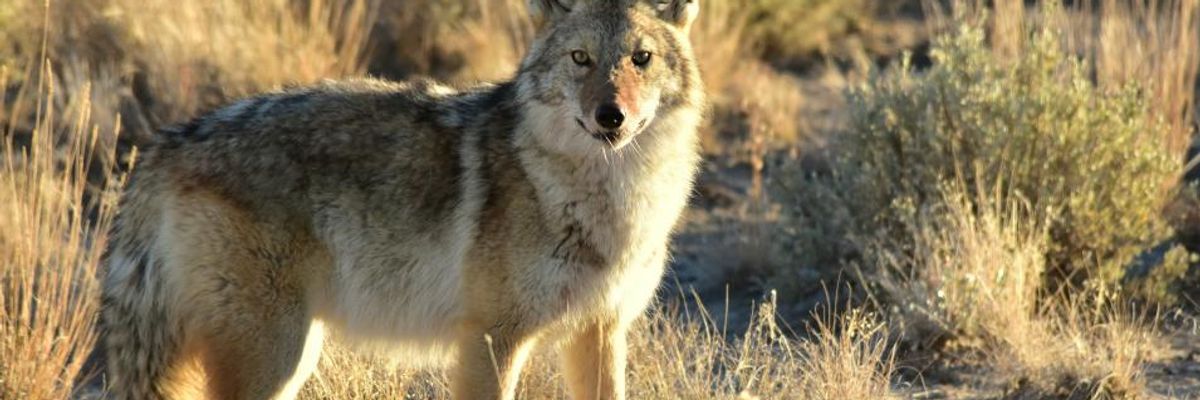Conservation and animal rights advocates celebrated a rare Trump era victory Thursday after the Environmental Protection Agency reversed its approval of so-called "cyanide bombs" to kill wildlife on public lands, a decision made last week that provoked impassioned public outcry.
"Obviously somebody at EPA is paying attention to the public's concerns about cyanide bombs."
--Brooks Fahy, Predator Defense
"I am announcing a withdrawal of EPA's interim registration review decision on sodium cyanide, the compound used in M-44 devices to control wild predators," agency Administrator Andrew Wheeler said in a statement Thursday, referring to the traps by their official name. "This issue warrants further analysis and additional discussions by EPA with the registrants of this predacide."
Brooks Fahy, executive director of Predator Defense, a wildlife group that opposes the spring-loaded poison traps, said in a statement to The Guardian that the EPA's reversal seemed to be the result of widespread outrage over the agency's initial authorization.
"Obviously somebody at EPA is paying attention to the public's concerns about cyanide bombs," said Fahy. "It would appear they're responding to public outrage over the interim decision from last week. Our phone has been ringing off the hook from concerned citizens regarding their greenlight to continue using these horrific devices. We'll have to see how this plays out."
M-44 devices have been used by Wildlife Services--a program of the U.S. Department of Agriculture--and state agencies in Montana, New Mexico, South Dakota, Texas, and Wyoming to kill animals like coyotes, but critics note that their use also threatens the lives of non-targeted animals such as foxes, bears, and family pets. The EPA had initally authorized the agencies to use traps on an interim basis, pending a final decision in 2021--before the agency changed course Thursday.
With respect to the agencies that use the traps, Wheeler added, "I look forward to continuing this dialogue to ensure U.S. livestock remain well-protected from dangerous predators while simultaneously minimizing off-target impacts on both humans and non-predatory animals."
"I'm thrilled that the EPA just reversed its wrongheaded decision to reauthorize deadly cyanide traps," Collette Adkins, carnivore conservation director at the nonprofit Center for Biological Diversity, told HuffPost in a statement. "So many people expressed their outrage, and the EPA seems to be listening. I hope the feds finally recognize the need for a permanent ban to protect people, pets, and imperiled wildlife from this poison."
HuffPost detailed an example of an M-44 impacting unintended targets:
In a heartbreaking encounter two years ago, one of the death traps was triggered in Pocatello, Idaho, as 14-year-old Canyon Mansfield was walking his dog, Casey. The dog died a violent death in front of Canyon, and the teen was rushed to a hospital, where he eventually recovered from exposure to the poison in the trap set by federal workers. His parents are suing the USDA's Wildlife Services over his poisoning.
Wheeler's announcement Thursday was also welcomed by Kieran Suckling, executive director of the Center for Biological Diversity, which was part of a lawsuit that blocked the use of the devices on 10 million acres in Wyoming earlier this week.
Following the court order in Wyoming, Western Watersheds Project executive director Erik Molvar--whose group was also part of the suit--said that "it's past time for the government to stop killing predators for the sake of the livestock industry."
The Associated Press reported Thursday that "in 2018, M-44s killed about 6,500 animals, mainly coyotes and foxes. That was down from about 13,200 animals in 2017."




